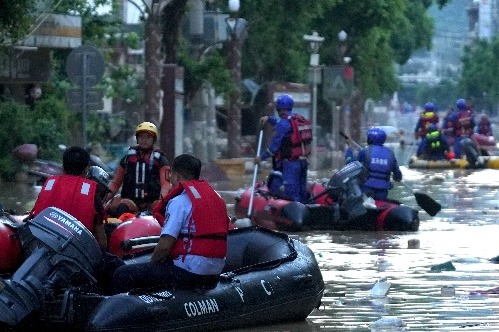Torch relay lights way with message of hope, solidarity


Olympic flame begins three-day journey as excitement builds for historic Winter Games
The torch relay for the 2022 Winter Olympic Games kicked off in host city Beijing on Wednesday morning, starting a three-day journey that will feature around 1,200 torchbearers across the three competition zones.
The relay set off from the capital's Olympic Forest Park and will travel through iconic locations in Beijing, Yanqing and Zhangjiakou, including the Great Wall and the Summer Palace, before reaching the Bird's Nest stadium for the opening ceremony on Friday evening.
Chinese Vice-Premier Han Zheng, also a member of the Standing Committee of the Political Bureau of the CPC Central Committee, lit the torch from a cauldron at a launch ceremony at the Olympic Forest Park and announced the start of the relay.
Cai Qi, president of the Beijing 2022 organizing committee and Party secretary of the CPC Beijing Municipal Committee, delivered a speech at the launch ceremony attended by about 400 athletes, students, volunteers and people from all walks of life.
He said the Games promote friendship and the Olympic torch relay offers great opportunities for bridging different cultures.
"The Olympic flame, a symbol of light, solidarity, peace and friendship, will light the torch of the Olympic Winter Games Beijing 2022, add its brilliance to Beijing, the host city of both the Summer and Winter Olympic Games, and write a new chapter of the Olympic Movement," Cai said.
The Olympic flame will spread the Olympic spirit and ignite public enthusiasm for the Games, he said, adding that in the face of the COVID-19 pandemic, Beijing always puts people's lives and health first and foremost and will "present an exceptional Olympic torch relay in an innovative way".
The torch relay has been scaled down and held under strict precautionary measures due to concerns surrounding the pandemic.
"We believe the Olympic flame will bring us confidence, warmth and hope, and dispel the gloom of the pandemic," he added.
Thomas Bach, president of the International Olympic Committee, said in a video message at the ceremony that the Olympic flame will show that Beijing is "ready to make history", becoming the first-ever host city for both the Summer and Winter Olympic Games.
"This is the timeless message that the Olympic flame will send from China to the world-we can only go faster, we can only aim higher, we can only become stronger, if we stand together," he said.
The first torchbearer was China's first winter sports world champion, 80-year-old former speed skater Luo Zhihuan. He participated in six world championships, topping the podium in 1963, but never got the chance to compete in the Winter Olympics because China was not a member of the IOC at the time.
He said he was ecstatic to be the first torchbearer of the Beijing Winter Olympics and being able to participate in the Games as a torchbearer was a dream come true. Luo also served as a torchbearer for the Beijing 2008 Summer Olympics.
The second torchbearer was Jing Haipeng, who was among the first astronauts to take part in China's Shenzhou space missions. He then passed the flame to aerospace engineer Ye Peijian, 77, who is a chief scientist for the country's lunar exploration program.
Other torchbearers in the first leg of the relay included Chinese basketball legend Yao Ming, Georgios Iliopoulos, Greece's ambassador to China, and Zhang Yimou, the director of the opening ceremony.
The second leg of the relay started at 11:35 am at the Beijing Winter Olympic Park and ended at former industrial complex Shougang Park, now home to the headquarters of the organizing committee and the Big Air Shougang ski jumping and snowboarding venue.
The route covered more than 20 kilometers, with 416 torchbearers participating.
This leg was led by short-track speed skater Wang Meng, a four-time Olympic champion. Wang, also a torchbearer for the 2008 Summer Olympics, said she felt very proud to renew torchbearing duties in the dual-Olympic city, and added she looked forward to seeing more achievements and breakthroughs from Team China.
Wang was followed by 83-year-old Shan Zhaojian, a former national skiing champion, and short-track speed skater Liu Qiuhong, among other torchbearers who have made outstanding contributions to winter sports.
The leg also featured an underwater torch relay completed by an amphibious robot and an underwater robot. The first robot slid along ice, dived into the water and passed the torch to the next robot, which traveled a distance before exiting the water.
The robot relay was supported by cutting-edge technology featuring high-precision underwater hovering and positioning. Clean and environmentally friendly, the torch burns reliably both in the air and under water without producing smoke, and can maintain the flame's visual effect. According to organizers, the torchbearers hail from all walks of life. Describing them as "extraordinary ordinary people", organizers explained that most of the torchbearers have made outstanding achievements to society in the science, education, culture and health sectors. They come from all across the country, with the eldest being 86 years old and the youngest 14.
Contact the writers at zhangyangfei@chinadaily.com.cn
Luo Zhihuan, 80, the relay's first torchbearer. In 1963, Luo became China's first winter sports world champion in speed skating, but he has never had a chance to compete in the Winter Olympics
"This moment is a dream come true for the senior generation of winter sports athletes like me. We have been dreaming of this moment for decades. I am so honored that I have the chance to be the torchbearer at both the 2008 Summer Olympics in Beijing and this one. It's a relay of the Olympic spirit, as well as the fighting spirit of the older generation to the next generation. I urge our athletes to carry this spirit and fight for the best results at the Games."























